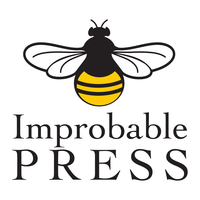By Atlin Merrick
Do pitch again.
 Sometimes an editor or publisher rejects your story or book but says "we really like your style, but we're looking something with more B, less A." For the love of all that's holy they just gave you a leg up in getting your book further along the process, please take it. All right, sure, maybe you don't want to put a lot more B into your book and that's fine. In that case pitch them another book, this one more B-centric.
Sometimes an editor or publisher rejects your story or book but says "we really like your style, but we're looking something with more B, less A." For the love of all that's holy they just gave you a leg up in getting your book further along the process, please take it. All right, sure, maybe you don't want to put a lot more B into your book and that's fine. In that case pitch them another book, this one more B-centric.
Do follow the yellow brick road.
As an editor, when I turn down a manuscript but I know of another publisher who's looking for that kind of tale, I give the writer the name of that publisher. Check that publisher out, the one I just recced. Heck, ask me for an editor's name and if possible I'll give you that, too.
Your submission is at hand!
I'm going to guess 99% of writers who sell their work didn't sell a thing for a long time—but they kept writing and submitting. That's pretty much the entire key to working as a writer: doing it and doing it and doing it. It's the only thing we know for sure has a chance to work, because the fame claw which picks one person in 1,000? No one knows where that claw will land and you can waste your life chasing it so…please don't. Just write and submit. That's what writers do.
3 Don'ts After Your Book Is Rejected
Don't ignore the submission guidelines.
Do you enjoy rejection? No? Then don't set yourself up for it by ignoring the couple hundred words most publishers have on their website—read their submission guidelines like they'll teach you how to defuse a bomb. Submission guidelines are your key to getting the editor's attention, and if you can't be bothered to read 'em and follow 'em then possibly you do enjoy rejection because that's what's coming.
Don't let me forget you.
If an editor rejected your book but praised your writing, pitch them something else, while you're still fresh in their memory. Or, if you met an editor at a convention or conference, if they looked you dead in the eye and said something sacred, like, "Send me your pitch Sachi," then for the love of six kinds of ponies send it within a few days. Because that editor possibly met a hundred people at that conference, maybe even their favorite writer, and so their brain? It's not going to retain stuff forever. If you were encouraged by an editor don't wait: send them something soon.
Don't try and start big.
If you want to sell novels, that's great, but a great way to have an editor ask you for your novel is to sell them a short story first. So if your favorite publisher is putting together an anthology about cheese-loving vampires and you write about coffee-loving werewolves, submit a cheese-vampire short story. Then, if the editor falls in love with it, tell them you also write about coffee-loving werewolves. This is how one of Improbable Press' writers went from an anthology appearance with IP, to her own book with us. Starting small works.
Rejection of your hard work is never easy but if you love writing, if you want to publish, you can do it if you keep doing it. Know that you're not alone, that 99% of the writers you admire were rejected—some many, many times—and yet here they are today, on your bookshelf.
That can be you if you keep going. So keep going.
Atlin Merrick is acquisitions editor for Improbable Press and IP wants your book. After you've had a look at our submission guidelines (and defused a bomb).
